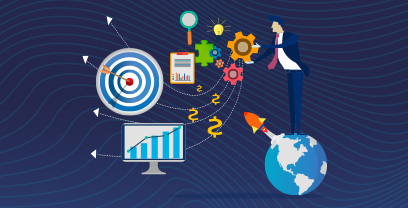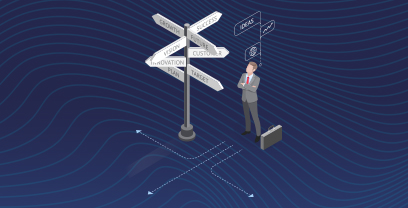Blog »
How Modern Software Empowers Procurement with Agility and Resilience in Times of Crisis
by Doug Keeley
The pandemic wreaked havoc on businesses and their supply chains, but even in these trying times, there’s a silver lining. What we learned about agility and resilience can be applied to future-proof the source-to-pay (S2P) process and help organizations meet any new challenge with confidence.
In a recent webinar, “How to Leverage S2P Platforms to Enable Supply Chain Resilience,” procurement experts from Forrester, Ivalua and Procurement Leaders discussed how digital transformation and the technologies that enable it can help companies mitigate risk and be more agile and resilient. In this way, they can be ready to face a crisis like Covid-19 or various other potential challenges — extreme weather caused by climate change, consumer demand for sustainable and ethically produced goods, trade wars or political tensions, to name a few.
As Forrester’s VP and Principal Analyst Duncan Jones noted, while avoiding risk is impossible, preparing for it is critical. “The job of sourcing professionals is to understand the risk in the supply chain and manage it so they can react quickly when a problem occurs.” Doing so safely requires having access to the right data, and the tools and technologies to act on it. It also requires a focus on procurement-supplier relationships, and striving to be the customer of choice for your suppliers.
Balancing New Priorities Makes Procurement More Valuable
Historically, Procurement was perceived as adding value when it could effectively control costs. But cost reduction is no longer sufficient. According to the Forrester research Jones shared, the mandate to reduce costs must not undermine other key priorities, such as improving customer experience, improving products and services, and accelerating the response to business and market changes.
What’s more, Jones said that successful organizations combine the creativity of how they build products and serve customers with agility and resilience. “Resilience and that ability to react quickly to change makes Procurement a much more strategic part of the organization, than if they focus only on reducing costs,” he said. Enabling this holistic strategy requires aggregating and analyzing data generated at every stage of Procurement — from sourcing to purchasing, to contract lifecycle management and invoicing — and extracting actionable insights that can inform decisions about suppliers, products, spend management and more.
Yet today’s Procurement organizations are plagued with inefficient processes, poor supplier stakeholder collaboration and data silos. “Manual processes limit efficiency and scalability,” said Ivalua’s Senior Product Marketing Manager, Doug Keeley. “This is largely due to a lack of collaboration within the enterprise, as well as with partners and suppliers, which has a negative impact both on revenue and customer satisfaction.”
Data silos also inhibit agility, Keeley said. “As you add tools and technologies to try to solve these challenges, the landscape becomes very complex, creating data silos that limit stakeholders’ access to the data they need to understand supplier capacities and forecast effectively.” Access to this data is especially important when there are supply chain disruptions, such as those caused by the global pandemic.
Start by Putting the Right Technology in Place
So, how can organizations achieve agility and resilience? Begin by adopting the right technology solutions for digital transformation — solutions that centralize data collected throughout the S2P lifecycle and provide actionable insights. “When selecting a platform to digitize operations and improve supplier management, you should look for modern software that uses data from multiple sources to help you make good decisions,” Jones said.
Automation is also an essential capability. With the right technology in place, organizations can automate repetitive, manual tasks and enable staff to focus on revenue-generating work rather than the minutiae of contract negotiation, supplier management, invoicing and other typically manual processes. The right S2P platform also helps prioritize tasks, making workdays — and workflows — far more efficient. It may even leverage AI to optimize decision-making, by tapping into relevant internal and external data and making recommendations that best serve the business and optimize spend.
For example, an advanced S2P platform can recommend certain suppliers for certain products, based on past bids and product or interaction data, eliminating time spent on researching suppliers for new orders. Just-in-time demand signals can be triggered at the manufacturing plant using Internet of Things (IoT) devices to put re-orders into motion or alert teams of late deliveries.
This highly automated approach, Jones suggested, is the future of Procurement and will enable organizations to be much more resilient and agile, especially in times of crisis. He added that the on-premise, monolithic ERP system will become a thing of the past, and will be replaced by best-in-class eProcurement platforms that can integrate with specialist tools such as CRM or service management systems.
Jones said organizations may have to rethink their relationship with suppliers, as well. “Suppliers today have the option of either sending the supply to you, or providing the same products and services to your competitors,” he said. “It’s critical to treat them as partners rather than vendors.”
Chassis Brakes and Meritor Digitally Transform with Ivalua
Two organizations who are already building agility and resilience through digital transformation are Chassis Breaks, a multinational manufacturer of automotive brakes and brake components, and Meritor, a manufacturer of military automobile components. Both customers of Ivalua, these organizations have digitally transformed global procurement and supply chain processes to reduce risk and spend, improve contract visibility and eliminate manual, administrative tasks.
Chassis Brakes first introduced the concept of eProcurement to the company about four years ago, with the goals of cleaning and centralizing supplier data, monitoring supplier performance, and digitizing direct and indirect spend processes. Achieving these goals would not only help Chassis Brakes control spend, it would improve product quality. Since implementing Ivalua, the Procurement team at Chassis Brakes has reduced indirect spend by 10%, while achieving 100% contract visibility and 99% purchase order coverage.
Meritor also began its digital transformation a few years ago, beginning with consolidating 12 different systems across various business units. Having disconnected solutions and processes that were mostly manual had resulted in inconsistent communication with suppliers, which weakened collaboration. When the company began to roll out Ivalua, it was preparing to launch 20 new products to drive a 20% revenue increase, while at the same time attempting to reduce product costs by 2.5%. Through digital transformation, Meritor not only achieved its goals, but brought $1.8 billion in direct spend under management, cut manual administrative tasks in half, and transformed New Product Introduction (NPI) into a competitive advantage.
These examples illustrate the power of an advanced S2P platform to help procurement teams deliver more value to their organizations, and ensure they have the right technologies in place to respond to any business need with speed and agility.
Nurture Supplier Relationships to Support Agility and Resilience
The pandemic has brought to light the importance of agility and resilience for business continuity, and modern Procurement organizations can add significant value in this area. Problems with any supplier can have a disruptive impact on the supply chain, and organizations who have visibility into all procurement processes — from source to pay — can mitigate risk and pivot quickly to keep the business running optimally. This begins with trustworthy data and the ability to analyze it for actionable insights.
But it’s not just about automation and efficiency; finding better ways to collaborate with suppliers is also an imperative. Done well, digital transformation can support stronger supplier relationships, which not only helps organizations be more agile and resilient, but provides the foundation for future innovation.
Watch the full webinar on-demand here. You can also download our recent report, “Achieving Resilience in the Manufacturing Supply Chain: Research & Learnings from Leading Manufacturers,” to read the findings from Ivalua and InudstryWeek’s new global research study of the manufacturing industry.

Doug Keeley
Product Marketing Manager
Prior to joining Ivalua, Doug spent 12 years with Directworks in Sourcing Consulting and Customer Success. During this time, he managed consulting engagements, worked with customers to implement lean processes, and managed SaaS implementations for global manufacturing enterprises. Doug has a B.S. in Marketing / International Business from the Pennsylvania State University and MBA from the University of Pittsburgh. He is leading global marketing activities for upstream procurement.
You can connect with him on Linkedin




